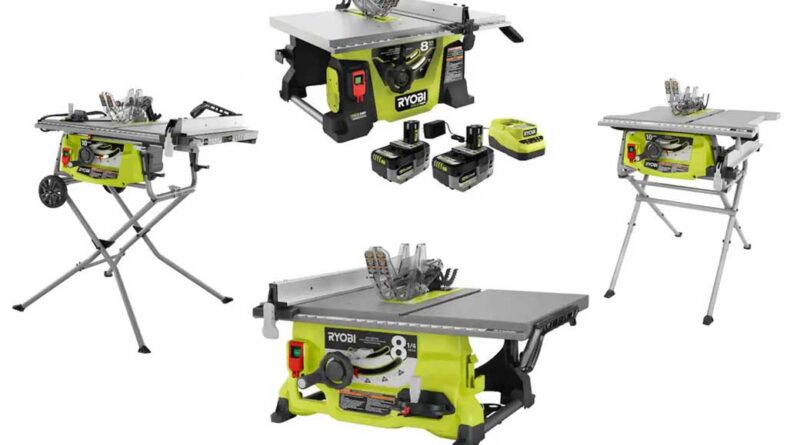Ryobi Table Saw: Is it a terrible buy?
Mention Ryobi in a woodworking or DIY group and watch the carnage unfold. Some hate the brand with a passion, others love it, and many say its a good start but not necessarily great for professionals. Before you dismiss or buy a Ryobi table saw, here are some things you should consider.
What are Ryobi tools?
Founded in 1943, Ryobi Seisakusho Co., Ltd. got its start selling die-cast products in 1944. By 1961, they manufactured off-set printing presses. They began making power tools in 1968 and formally changed the name to Ryobi, Ltd in 1973.
In 1996, Techtronic Industries (TTI), a Hong Kong based company, took over Ryobi brand in America. TTI owns several brands of tool companies, including Milwaukee and HART, as two prominent examples.
Currently, Ryobi offers a wide range of power tools and outdoor equipment, including several variations of table saws, both battery operated and corded.
Ryobi is one of two flagship brands sold at Home Depot and is generally marketed towards do it yourselfers (DIYers). The other is Rigid, which they generally market towards professional contractors and such.
While many professionals look down on Ryobi for being not good quality, for the average hobbyist, DIYer, crafter, or weekend woodworker, Ryobi brand products will more than suite your needs. If you use your tools 5 to 6 days a week for several hours each day, you may find that Ryobi brand may be a way to get started, but you will likely be looking to upgrade your tools within a few years.
Types of Ryobi table saw
Like many other brands, there is not one single Ryobi table saw. Currently, they offer:
- Corded Ryobi tablesaw – provides consistent power but will need an extension cord when working in the yard or areas without easy access to an outlet
- Battery operated Ryobi tablesaw – battery operated can lose power mid-cut and requires frequent battery changes but can go just about anywhere you need to work
Tip: If you plan to work a lot in your backyard, different job areas, or places with limited power sources, the battery version may work better for your needs.
Ryobi offers the following table saws:*
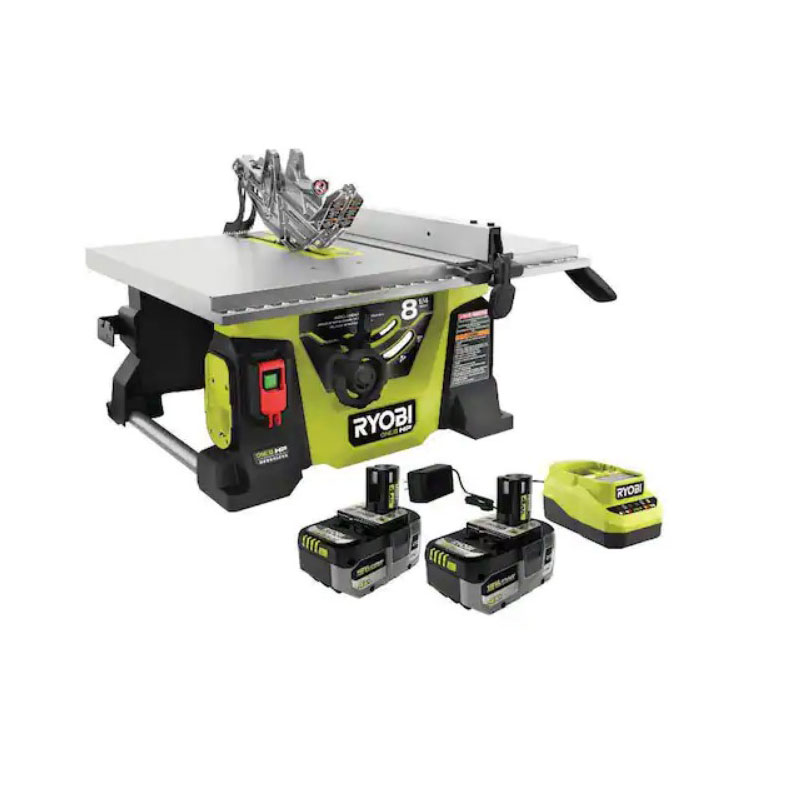
18V ONE+ HP Brushless 8-1/4″ Table Saw (battery operated)
- battery operated
- 8 1/4″ blade (included)
- cuts wood
- 12″ rip capacity – smallest rip capacity of available models
- 2 1/4″ depth of cut (90 degrees)
- 1 3/4″ depth of cut (45 degrees)
- no load speed: 4,500 rotation per minute
- 18 volt – provides LED battery status indication light
- 2 1/2″ dust port
- 3 year limited warranty
- holds push stick
- cannot use dado stack
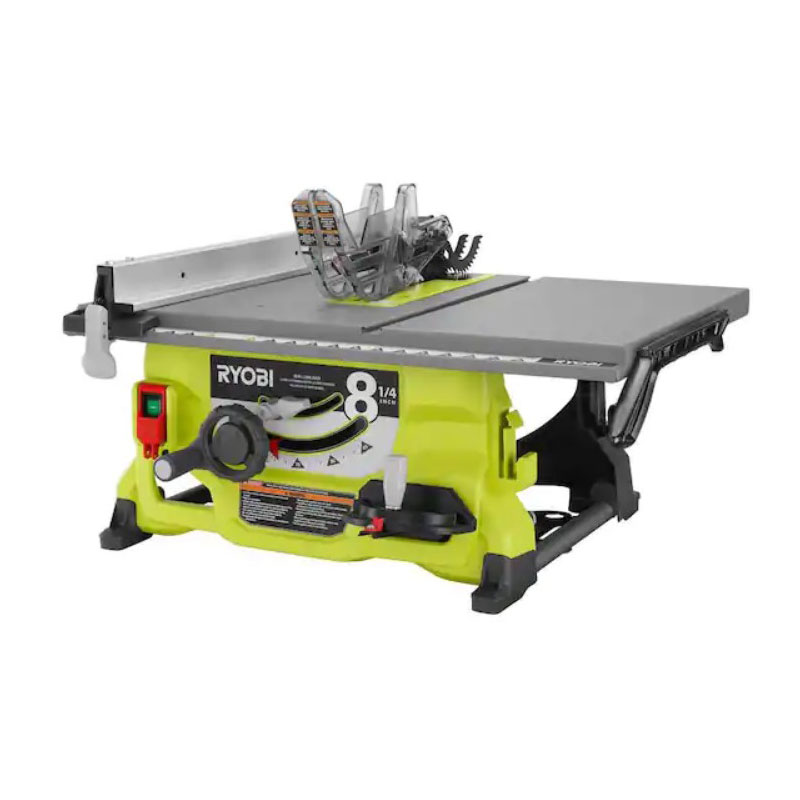
8-1/4” Compact Table Saw (corded)
- 8 1/4″ blade (included)
- cuts wood
- 12 1/2 inch rip capacity (right of blade)
- 7 inch rip capacity (left of blade)
- 2.2″ depth of cut (90 degrees)
- 1 5/8″ depth of cut (45 degrees)
- no load speed: 5,700 rotation per minute
- 13 Amp, 120V motor
- built-in dust collection chute (requires vacuum or dust collection system hookup)
- 3 year limited warranty
- holds push stick
- cannot use dado stack
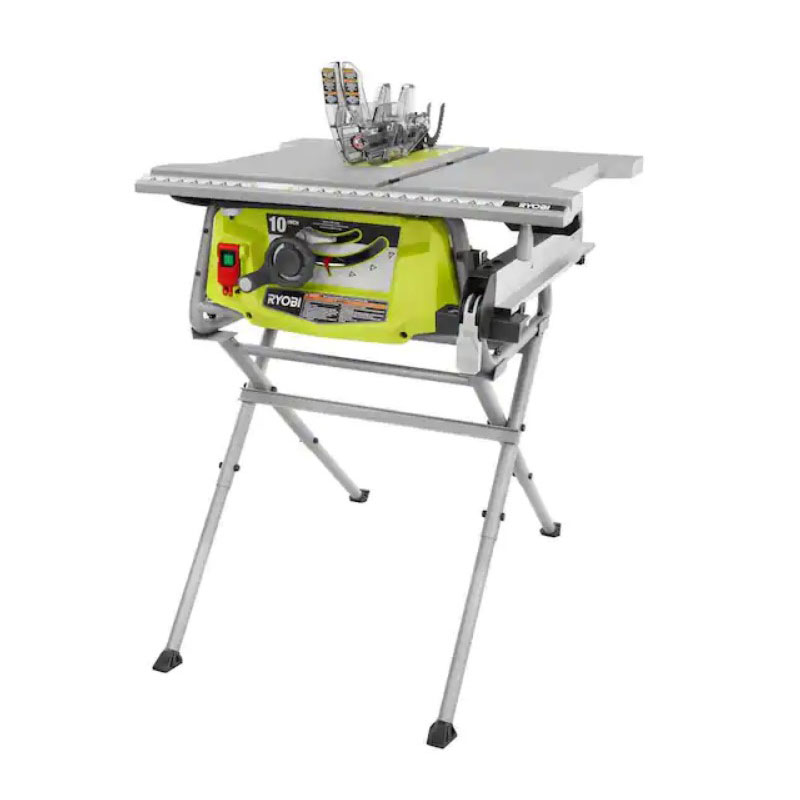
10″ Table Saw with Folding Stand (corded)
- 10″ blade
- includes a folding stand
- requires a standard outlet for use
- cuts wood
- 27 inch rip capacity (right of blade) – largest rip capacity option of the available Ryobi table saws
- 7 inch rip capacity (left of blade)
- can use a 1/2″ dado set
- 3″ depth of cut (90 degrees)
- 2 1/2″ depth of cut (45 degrees)
- no load speed: 5,000 rotation per minute
- 15 Amp, 120V motor
- built-in dust collection chute (requires vacuum or dust collection system hookup)
- 3 year limited warranty
- built in storage for all accessories (push stick, miter gauge)
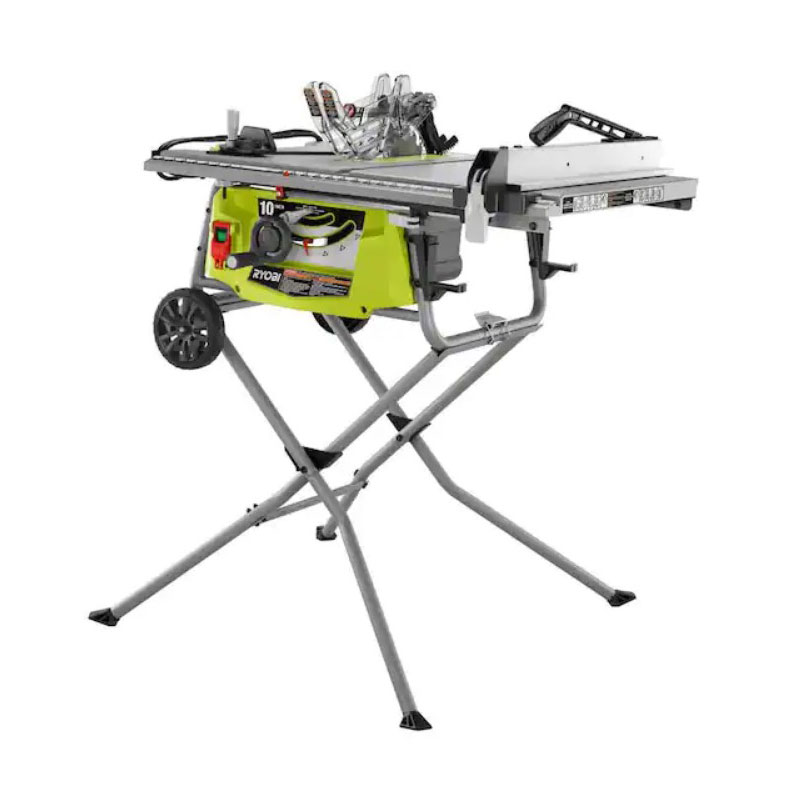
10″ Expanded Capacity Table Saw with Rolling Stand (corded)
- 10″ blade
- includes a folding stand with wheels for easy transportation and more compact storage
- requires a standard outlet for use
- cuts wood
- 12 inch rip capacity (right of blade)
- 7 inch rip capacity (left of blade)
- can use a 1/2″ dado set
- 3″ depth of cut (90 degrees)
- 2 1/2″ depth of cut (45 degrees)
- no load speed: 5,000 rotation per minute
- 15 Amp, 120V motor
- built-in dust collection chute (requires vacuum or dust collection system hookup)
- 3 year limited warranty
- built in storage for all accessories (push stick, miter gauge)
*While I do my best to keep up to date with available Ryobi table saws, availability may change. Believe it or not, I don’t own Ryobi and have no control over the products they offer. For an absolute up to date list, you can also visit Ryobi tools.
What’s the difference between the different types of Ryobi table saws?
Ryobi table saws have some similar features, but they also have some differences that set them apart from each other. Here’s a quick breakdown of how they differ:
- Blade size or depth of cut: You’ll notice they offer two sizes of blade: 8 1/4 inches and 10 inches. They represent the diameter of the blades. As you probably guessed, the main difference is how thick a piece of lumber you can cut. Keep in mind, a table saw (Ryobi or any other brand) can only cut a portion of the actual diameter of the blade. An 8 1/4 Ryobi table saw blade can cut up to about 2.25 inches at a 90 degree angle and about 1.75 inches at a 45 degree angle. A 10 inch Ryobi table saw blade can cut up to about 3 inches at a 90 degree angle or 2.5 inches at a 45 degree angle.
- Battery vs corded: As I already covered, a Ryobi table saw with a battery can go to worksites that are far away from any power source making them slightly more mobile. They could lose power as the battery starts to die. The corded type offers both larger sized blades on some models as well as consistent power.
- Included stands: Some of the Ryobi tablesaw models come with stands that you assemble. These allow you to set up your saw where ever you want and then fold it back up. The wheeled stand is helpful if you want to move your table saw around to different locations. If you have a dedicated spot to hold or store your saw, you may not need a model with a stand.
- Rip capacity: Rip capacity is the distance between the fence’s edge and the table saw blade when the rip fence is at its furthest position. While you can use ta table saw without the build in fences, it helps keep the piece going straight. You can also build the a stand around the table saw and create your own adjustable rip fence.
Where to buy a Ryobi table saw
You can purchase a Ryobi table saw from your local Home Depot, the Home Depot website, or Amazon. You may also luck out and find one on Facebook marketplace, other secondhand online store, or yard sales.
Pros and Cons of Ryobi table saws
Pros
- Generally affordable pricing for table saws
- Each includes a starter blade, rip fence, miter gauge, push stick, and blade guard assembly
- Good choice for hobbyists, DIYers, and those who won’t be using their table saw in extreme conditions
- Even 10″ Ryobi table saw can fit in small garage or workshop spaces or tuck away easily for storage
- You can use competitor blades for the saws so you don’t need to only buy Ryobi brand blades
Cons
- Ryobi only offers compact and contractor size table saws, so those looking for larger options may need to consider Delta, Stop Saw, or other competitors that offer larger sizes of table saw
- Contractors may find the saw does not stand up to daily, rigorous use
- Ryobi table saws do not offer more than industry standard safety features, so those looking for more advanced safety features may need to look at other brands
Top considerations before buying a Ryobi table saw
Whether you’re looking for a replacement or your first table saw, here are the top things to consider before deciding to purchase or walk away from a Ryobi table saw:
- Cost – Ryobi table saws are lower to mid range in price. You can find some cheaper models at stores like Harbor Freight or other discount tool stores in your area. But a Ryobi tablesaw is generally decent quality for a decent price.
- Intended use – If you do heavy contract or construction work, a Ryobi table saw may not be the best choice for your needs. On the other hand, if you use it occasionally on weekends or not every day, they can provide you with a decent cut and last for quite a while. Also, if you intend to make cabinets and other large pieces, you may find you need a larger saw than ones Ryobi makes.
- Features – Ryobi table saws offer limited features that most other brands offer, including a push stick, miter gauge, blade guard, rip fence, and blade wrench (not really a feature, you actually need it to replace the blades). They also come with one blade that fits the saw. Additional safety or other features are not included.
- Safety – Table saws are one of the more dangerous tools in the workshop. This does not mean you should fear it but rather respect it. Some high end models of table saw, like Saw Stop, have built in brakes and stops to instantly stop the blade if it detects flesh. Ryobi table saws do not do this. Don’t touch the blade. You don’t want to find out if you can get to the hospital fast enough to attach a severed finger or hand before you bleed out.
- Space – I mentioned this early, but space – like intended use and budget/cost – can play a huge role in your decision to get a table saw. You don’t want to get a large table saw if you don’t have the space to store or use it. Ryobi, like many other brands, offer smaller models that you can more easily store in compact spaces. They are roughly the size of their competitors, so getting a DeWalt, won’t save much, if anything, on space.
- Blade compatibility – Ryobi table saws can accommodate any brand of blade as long as it fits the saw size. So make sure not to be stupid here. If you get the 8 1/4 table saw, don’t get a 10 inch replacement blade. But you can get better quality blades from any brand to make quality cuts and have a longer lifetime.
- Reviews – Despite a negative reputation among contractors, consumers generally rate Ryobi table saws highly on sites like Home Depot. For example, at the time of writing this, the 8 1/4 inch compact table saw has over 1500 reviews and 4.5 out of 5 star rating with a similar rating on Amazon of 4.3 out of 5 stars. Consumers generally rate it well in quality for price, ease of use, and durability.
Take away
A Ryobi table saw may serve you well if you are not using it hard every day, have limited space or need to move it around to different worksites in and around your house, are on a budget, or want a decent quality saw for a reasonable price. You may want to avoid their saws if you intend to do extensive work with it most days of the week.
Ryobi table saws offer industry standard features, including blade sizes, push sticks, miter gauge, and rip fence. You can replace the blade with any number of widely available blades, not just Ryobi brand.
If you are looking for a generally reliable saw for your DIY or woodworking needs, then a Ryobi table saw will likely serve you well for several years. If nothing else, a Ryobi table saw may be a good starter saw if you are new to DIY work or woodworking.
Need more help?
If you are building your workshop and trying to decide between a miter saw (chop saw) or table saw, check out the benefits and draw backs of each in this comparison post.
If you are new to wood working, check out this post of suggestions for getting started.
Not ready to commit to a table saw or lack the space? You should consider getting a Ryobi circular saw. Check out the reasons here.
